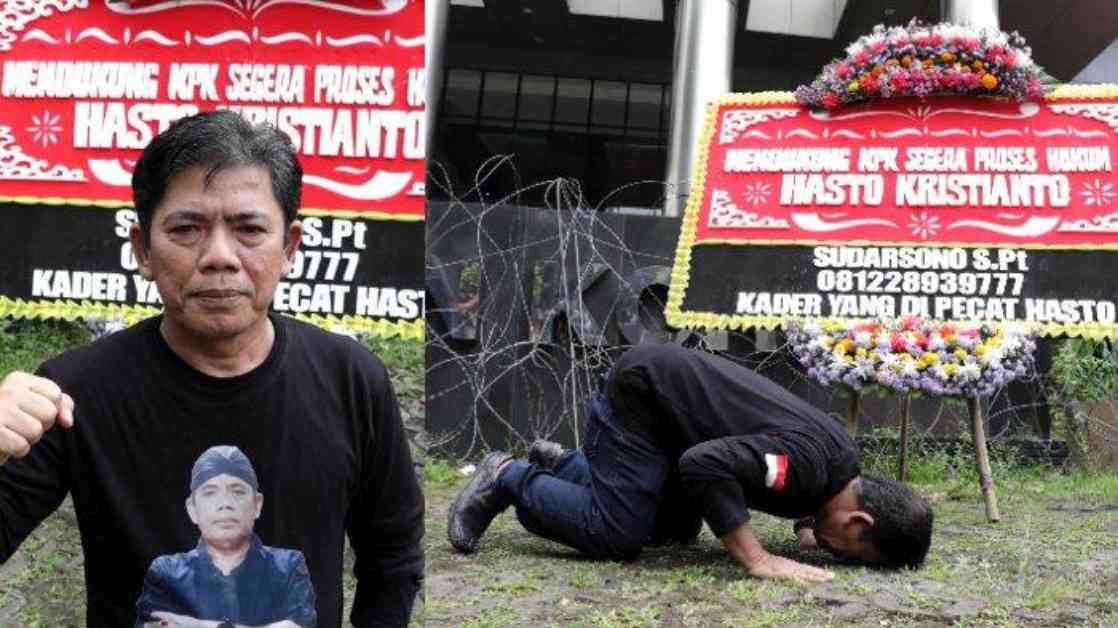PDIP Secretary General Misses KPK Summons, Urged to Comply by Former Party Member
In a recent development that has captured the attention of the public and political circles alike, the Corruption Eradication Commission (KPK) had scheduled an examination of the Secretary General of the Indonesian Democratic Party of Struggle (PDIP), Hasto Kristiyanto. This scrutiny pertains to allegations of bribery and obstruction of justice involving former PDIP politician Harun Masiku on Monday, February 17, 2025.
However, Hasto opted to request a postponement of the interrogation, resulting in his absence on the appointed day. This decision raised eyebrows and prompted a stern response from Sudarsono, a former PDIP member from Pemalang Regency.
Sudarsono, known for his outspoken nature, did not mince words as he urged Hasto not to gamble with the fate of the nation and its people. “I respectfully ask Hasto not to gamble with the fate of the nation and the conditions of society,” he emphasized in a statement reported by Kompas TV on the same day.
The former Vice Chairman of the Cadreization and Ideology Division of the PDIP Pemalang District Council underscored the importance of tranquility for the public. He stressed the need for Hasto to abide by existing legal processes and be held accountable for his actions. Sudarsono highlighted that the integrity of the Republic of Indonesia (NKRI) transcends individual cases like those involving the PDIP, including Hasto, and extends to numerous other legal matters.
“We, as a nation, aspire to maintain a peaceful environment. Our beloved NKRI is not just about addressing PDIP-related cases or those of Hasto alone but encompasses a multitude of other issues,” Sudarsono elaborated.
He further urged Hasto to respect the legal process in place and take responsibility for his actions. Sudarsono’s impassioned plea reflected a sense of duty towards upholding the rule of law and ensuring accountability, resonating with many who value justice and transparency in governance.
From Party Expulsion to KPK Summons: A Personal Perspective
Adding a personal touch to his remarks, Sudarsono alluded to his own expulsion from the PDIP by Hasto Kristiyanto. The context of his dismissal stemmed from his vocal advocacy for Hasto’s prompt investigation regarding the alleged bribery and obstruction of justice linked to former PDIP member Harun Masiku.
As someone who experienced expulsion from the party, Sudarsono questioned Hasto’s reluctance to comply with due legal processes. He drew attention to the irony of his willingness to travel from Pemalang, Central Java, to the KPK building for official proceedings, contrasting sharply with Hasto’s decision to evade the KPK summons.
Through his personal narrative, Sudarsono shed light on the complexities of loyalty, accountability, and ethical conduct within political organizations. His story served as a poignant reminder of the challenges and ethical dilemmas that individuals often face when navigating the intersection of politics and justice.
Embracing Accountability and Upholding Justice: The Way Forward
As the public eagerly awaits Hasto’s response to the KPK summons and Sudarsono’s impassioned plea for accountability, the broader implications of this case resonate deeply. The intertwined themes of legal compliance, ethical responsibility, and national integrity underscore the significance of upholding the rule of law and transparency in governance.
Experts in political ethics and governance emphasize the critical role of leaders in setting a precedent for ethical conduct and accountability within political parties. Dr. Maria Wibisono, a renowned political analyst, highlights the importance of leaders leading by example and adhering to legal processes to foster public trust and confidence in the political system.
As the saga unfolds, the spotlight remains on Hasto Kristiyanto and the PDIP, underscoring the broader implications for political accountability and ethical governance in Indonesia. The outcome of this case will undoubtedly shape public perceptions of integrity, justice, and transparency in the political landscape, setting a precedent for future ethical conduct within political parties and government institutions.
In the realm of politics, accountability is not merely a legal obligation but a moral imperative that resonates with citizens who value transparency, integrity, and justice. As the nation watches with bated breath, the actions and decisions of political leaders like Hasto Kristiyanto will undoubtedly shape the trajectory of ethical governance and democratic principles in Indonesia.





















